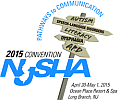Recreational Participation and Social Communication in Adults with Developmental Disabilities
Thursday, 4:00pm to 6:00pm
Seabright
Poster 2
An investigation was conducted examining factors that facilitate, or create barriers to, recreational participation and social communication for adults with Developmental Disorders (DD). Adults with DD represent an underserved population for speech-language services. This topic of investigation is important to the field of speech-language pathology because ASHA Principle of Ethics III states: 'Individuals shall honor their responsibility to the public by supporting the development of services designed to fulfill the unmet needs of the public.' The professional literature demonstrated that typical populations exhibit extremely negative attitudes towards engagement in social interactions with adults who have DD. Academic research has established that socialization processes are inherent in recreational pursuits. However restricted transportation options exacerbate accessibility to limited recreational and social opportunities that exist for adults with DD.
The research design utilized was a non-experimental mixed method study. A thirty question survey comprised of discrete questions with corresponding response prompts linked to a Likert scale and open ended questions that required extemporaneous response probed the participants' experiences regarding availability of recreational and social communication opportunities. The investigation found that an adult special needs social recreational group, (SNSRG), facilitated peer based social communication and provided communicative support through the modification and enhancement of the communication environment. Therefore, providing advocacy and support for Adult SNSRGs are appropriate endeavors for Speech-Language Pathologists as these programs can facilitate social communication and provide communicative support to a population that is in need of, but underserved for, speech-language services.
Track:
Adult
